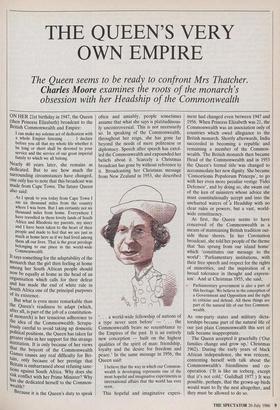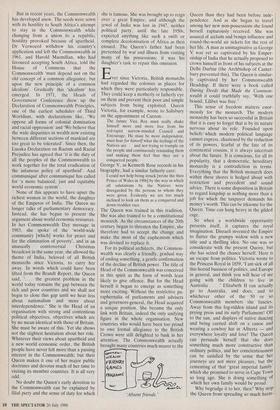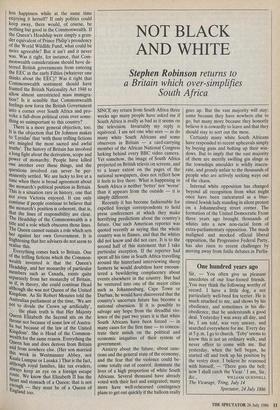THE QUEEN'S VERY OWN EMPIRE
The Queen seems to be ready to confront Mrs Thatcher. Charles Moore examines the roots of the monarch's obsession with her Headship of the Commonwealth
ON HER 21st birthday in 1947, the Queen (then Princess Elizabeth) broadcast to the British Commonwealth and Empire:
I can make my solemn act of dedication with a whole Empire listening . . . . I declare before you all that my whole life whether it be long or short shall be devoted to your service and the service of our great imperial family to which we all belong.
Nearly 40 years later, she remains as dedicated. But to see how much the surrounding circumstances have changed, one only has to note that this broadcast was
made from Cape Town. The future Queen also said:
As I speak to you today from Cape Town I am six thousand miles from the country where I was born. But I am certainly not six thousand miles from home. Everywhere I have travelled in these lovely lands of South Africa and Rhodesia my parents, my sister and I have been taken to the heart of their people and made to feel that we are just as much at home here as if we had lived among them all our lives. That is the great privilege belonging to our place in the world-wide Commonwealth.
It says something for the adaptability of the monarch that the girl then feeling at home among her South African people should now be equally at home as the head of an organisation which calls for their defeat and has made the end of white rule in South Africa one of the principal purposes of its existence.
But what is even more remarkable than the Queen's readiness to adapt (which, after all is part of the job of a constitution- al monarch) is her tenacious adherence to the idea of the Commonwealth. Scrupu- lously careful to avoid taking up domestic political positions, the Queen has taken far greater risks in her support for this strange institution. It is only because of her views that the boycott of the Commonwealth Games causes any real difficulty for Bri-
tain, only because of her prestige that Britain is embarrassed about refusing sanc-
tions against South Africa. Why does she risk conflict with her Prime Minister? Why has she dedicated herself to the Common- wealth?
Because it is the Queen's duty to speak often and amiably, people sometimes assume that what she says is platitudinous- ly uncontroversial. This is not necessarily so. In speaking of the Commonwealth, throughout her reign, she has gone far beyond the needs of mere politeness or diplomacy. Speech after speech has extol- led the Commonwealth and expounded her beliefs about it. Scarcely a Christmas broadcast has gone by without reference to it. Broadcasting her Christmas message from New Zealand in 1953, she described . . a world-wide fellowship of nations of a type never seen before' — `. . the Commonwealth bears no resemblance to the Empires of the past. It is an entirely new conception — built on the highest qualities of the spirit of man: friendship, loyalty and the desire for freedom and peace.' In the same message in 1956, the Queen said:
I believe that the way in which our Common- wealth is developing represents one of the most hopeful and imaginative experiments in international affairs that the world has ever seen.
This hopeful and imaginative experi-
ment had changed even between 1947 and 1956. When Princess Elizabeth was 21, the Commonwealth was an association only of countries which owed allegiance to the British monarch. Shortly afterwards, India succeeded in becoming a republic and remaining a member of the Common- wealth. The British monarch then became Head of the Commonwealth and in 1953 the Queen's formal title-was changed to accommodate her new dignity. She became `Consortionis Populorum Princeps', to go with her even more peculiar vestige 'Fidel Defensor', and by doing so, she swam out of the ken of ministers whose advice she must constitutionally. accept and into the uncharted waters of a Headship with no clear rules or powers, but a vast, world- wide constituency.
At first, the Queen seems to have conceived of the Commonwealth as a means of maintaining British tradition out- side these shores. In her Coronation broadcast, she told her people of the theme that 'has sprung from our island home' which `constitutes our message to the world': 'Parliamentary institutions, with their free speech and respect for the rights of minorities, and the inspiration of a broad tolerance in thought and express- ion'. And at Christmas 1955, she said,
Parliamentary government is also a part of this heritage. We believe in the conception of a Government and Opposition and the right to criticise and defend. All these things are part of the natural life of our free Common- wealth.
As one-party states and military dicta- torships became part of the natural life of our just plain Commonwealth this sort of talk became inappropriate.
The Queen accepted it gracefully (`Our families change and grow up,' Christmas 1962). During the early years of black African independence, she was reticent, contenting herself with talk about the Commonwealth's friendliness and co- operation. (It is like an iceberg, except that it's not cold,' Guildhall 1977.) It was possible, perhaps, that the grown-up birds would want to fly the nest altogether, and they must be allowed to do so. But in recent years, the Commonwealth has developed anew. The seeds were sown with its hostility to South Africa's attempt to stay in the Commonwealth while changing from a union to a republic, hostility provoked because of apartheid. Dr Verwoerd withdrew his country's application and left the Commonwealth in 1961, and Harold Macmillan, who had favoured accepting South Africa, told the House of Commons that the Commonwealth 'must depend not on the old concept of a common allegiance, but upon the new principle of a common idealism'. Gradually this 'idealism' has emerged. In 1971, the Heads of Government Conference drew up the Declaration of Commonwealth Principles, one of the earliest schedules of Third Worldism, with declarations like, 'We oppose all forms of colonial domination and racial oppression' and 'We believe that the wide disparities in wealth now existing between different sections of mankind are too great to be tolerated'. Since then, the Lusaka Declaration on Racism and Racial Prejudice has agreed that 'it is the duty of all the peoples of the Commonwealth to work together for the total eradication of the infamous policy of apartheid'. And communique after communiqué has called for 'a more balanced, just and equitable world economic system'.
None of this appears to have upset the richest woman in the world, the daughter of the Emperor of India. The Queen no longer talks of parliamentary democracy. Instead, she has begun to present the argument about world economic resources. In her Commonwealth Day message in 1983, she spoke of the 'world-wide community [which] works for peace and for the elimination of poverty', and in an unusually controversial Christmas broadcast in the same year, she allowed the theme of India, beloved of all British monarchs since Victoria, to carry her away. In words which could have been lifted from the Brandt Report, the Queen said, . the greatest problem in the world today remains the gap between the rich and poor countries and we shall not begin to close this gap until we hear less about nationalism and more about interdependence.' She is the Head of an organisation with strong and contentious political objectives, objectives which are by no mean identical with those of Britain. She must be aware of this. Yet she shows not the slightest hesitation about her role. Whatever their views about apartheid and a new world economic order, the British people have never felt more than a passing interest in the Commonwealth; but their Queen makes it one of her major public doctrines and devotes much of her time to visiting its member countries. It is all very odd.
No doubt the Queen's early devotion to the Commonwealth can be explained by filial piety and the sense of duty for which she is famous. She was brought up to reign over a great Empire, and although the jewel of India was lost in 1947, neither political party, until the late 1950s, expected anything like such a swift or complete decolonisation of Africa as then ensued. The Queen's father had been prevented by war and illness from visiting many of his possessions; it was his daughter's task to repair this omission.
Ever since Victoria, British monarchs had regarded the colonies as places for which they were particularly responsible. They could keep a motherly or fatherly eye on them and prevent their poor and simple subjects from being exploited. Queen Victoria, for example, wrote to Salisbury on the appointment of Curzon: The future Vice Roy must really shake himself more and more free from his red-tapist narrow-minded Council and Entourage. He must be more independent, must hear for himself what the feelings of the Natives are. . . and not trying to trample on the people and continuously reminding them and making them feel that they are a conquered people.
George V, as Kenneth Rose records in his biography, had a similar fatherly care:
I could not help being struck [wrote the then Prince of Wales in 1906] by the way in which all salutations by the Natives were disregarded by the persons to whom they were given. Evidently we are too much inclined to look on them as a conquered and down-trodden race.
The Queen was trained in this tradition. She was also trained to be a constitutional monarch. As the circumstances of the 20th century began to threaten the Empire, she therefore had to accept the change and make the most of the euphemism which was devised to replace it.
For its political architects, the Common- wealth was clearly a friendly, gradual way of ending something, a gentle confirmation of the decline of British power. The title of Head of the Commonwealth was conceived in this spirit as the form of words least likely to give offence. But for the Head herself it began to emerge as something more exciting. Without the restrictive pa- raphernalia of parliaments and advisers and governors-general, the Head acquired a unique position. She became the only link with Britain, indeed the only unifying figure in the whole organisation. New countries who would have been too proud to owe formal allegiance to the British Crown were still delighted to bask in her attention. The Commonwealth actually brought many countries much nearer to the
'Absent friends.' Queen than they had been before inde- pendence. And as she began to travel among her new non-possessions she found herself rapturously received. She was assured of acclaim and benign influence and round-the-world air tickets for the rest of her life. A man as unimaginative as George V was vet so captivated by his Emper- orship of India that he actually proposed to crown himself in front of his subjects at the Delhi Durbar (the Archbishop of Canter- bury prevented this), The Queen is similar- ly captivated by her Commonwealth Headship. If there were a book called Daring Deeds that Made the Common- wealth it could truthfully say, 'With one bound, Lilibet was free.'
This sense of freedom matters enor- mously for the monarch. The modern monarchy has been so successful in Britain that it is easy to forget that is by its nature nervous about its role. Founded upon beliefs' which modern political language cannot express, chastened by the reduction of its powers, fearful at the fate of its continental cousins, it is always uncertain about the future. It is conscious, for all its popularity, that a democratic, hereditary monarchy is a contradiction in terms. Everything that the British monarch does within these shores is hedged about with restriction and precedent and sound advice. There is some disposition in Britain to regard kingship as nothing more than a job for which the taxpayer demands his money's worth. This can be irksome for the Queen. Time can hang heavy in the gilded cage.
So when a worldwide opportunity presents itself, it captures the royal imagination. Disraeli invented the Empire to flatter the grumpy widow with a new title and a thrilling idea. No one was so considerate with the present Queen, but she has seized the chance herself. Here is an escape from politics. Victoria wrote to the Princess Royal in 1859, 'I am sick of all this horrid business of politics, and Europe in general, and think you will hear of me going with the children to live in Australia , .' Elizabeth II can actually go to Australia, and does, and to whichever other of the 50 or so Commonwealth members she fancies. Away from this fog-ridden island and its prying press and its surly Parliament! Off to the sun, and displays of native dancing and being carried aloft on a canoe and wearing a cowboy hat in Alberta — and everywhere loyalty and love! The Queen can persuade herself that she does something much more constructive than ordinary politics, and her conscientiousness can be satisfied by the sense that her journeys are not mere pleasure, but the cementing of that 'great imperial family' which she promised to serve in Cape Town so long ago. She is doing something of which her own family would be proud.
Why begrudge it to her, then? Why stop the Queen from spreading so much harm-
less happiness while at the same time enjoying it herself? If only politics could keep away, there would, of course, be nothing but good in the Commonwealth. If the Queen's Headship were simply a gran- der equivalent of Prince Philip's presidency of the World Wildlife Fund, what could be more agreeable? But it isn't and it never was. Was it right, for instance, that Com- monwealth considerations should have de- terred British governments from entering the EEC in the early Fifties (whatever one thinks about the EEC)? Was it right that Commonwealth sentiment should have framed the British Nationality Act 1948 to allow almost unrestricted mass immigra- tion? Is it sensible that Commonwealth feelings now force the British Government into a corner over South Africa and pro- voke a full-dress political crisis over some- thing so unimportant to this country? There is a more general objection, too. It is the objection that Dr Johnson makes to `Lycidas' that 'with these trifling fictions are mingled the most sacred and awful truths'. The history of Britain has involved a long fight about the derivation, scope and Power of monarchy. People have killed one another over these things, and the questions involved can never be per- manently settled. We are lucky to live at a time when there is broad agreement about the monarch's political position in Britain. This is a situation rare in history, one that not even Victoria enjoyed. It can only Continue if people continue to believe that the monarch's position is coherent, that is, that the lines of responsibility are clear. The Headship of the Commonwealth is a title and a role which obscures those lines. The Queen cannot sustain a role which sets her against her own Government. It is frightening that her advisers do not seem to realise this.
Everything comes back to Britain. One of the trifling fictions which the Common- wealth invented is that the Queen's Headship, and her monarchy of particular members such as Canada, exists quite separately from her monarchy of Britain, as if, in theory, she could continue Head although she was not Queen of the United Kingdom. As Sir Robert Menzies told the Australian parliament at the time, 'We are not to divide the Crown up artificially', • • . the plain truth is that Her Majesty Queen Elizabeth the Second sits on the throne not because of some law of Austra- lia but because of the law of the United Kingdom'. She is Head of the Common- wealth for the same reason. Everything the Queen has and does derives from Britain and from nowhere else. (Her son married this week in Westminster Abbey, not Kuala Lumpur or Lusaka.) That is the fact, although royal families, like tax evaders, always keep an eye on a foreign escape route. We know that Elizabeth H has the heart and stomach of a Queen; that is not enough — they must be of a Queen of England too.




















































 Previous page
Previous page